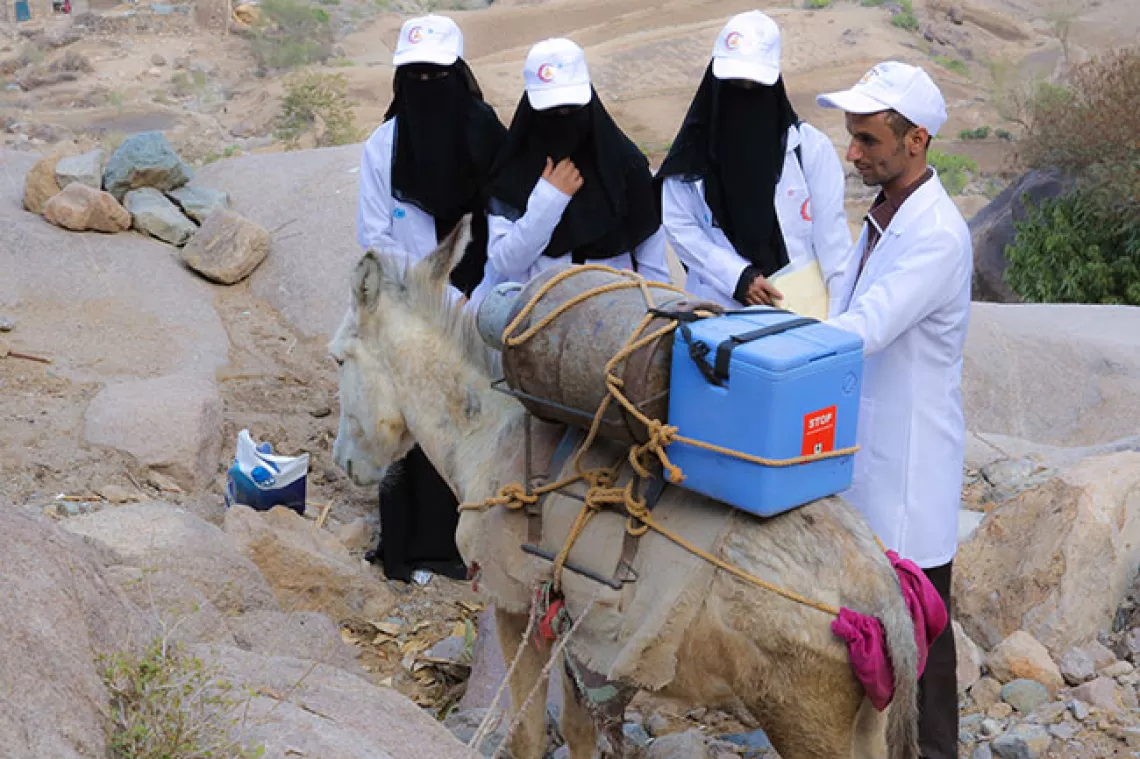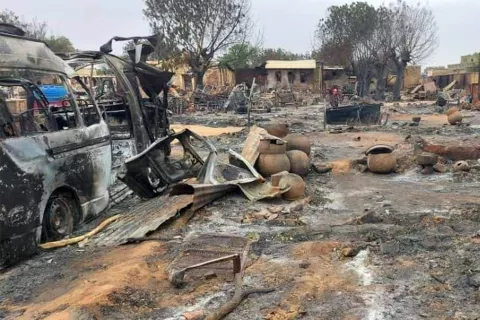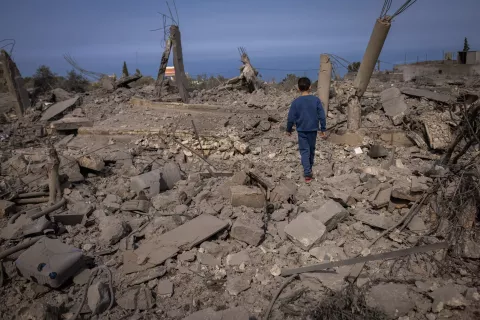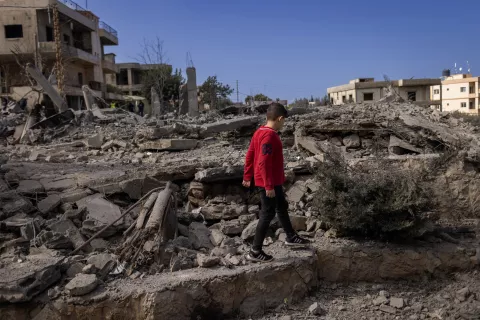Unsung heroes: Vaccinators climb mountains to save children’s lives in Yemen
In the face of Yemen’s crumbling health system, mobile vaccination teams are reaching children with life-saving services

SANA’A, Yemen, 27 March 2017 – Vaccinating children against life-threatening diseases in the middle of an intense conflict can be a tough challenge. Over the past few weeks, polio vaccinators in Yemen have braved rough terrains and crossed hostile frontlines, criss-crossing valleys and mountains to reach children, some of whom have been displaced by the conflict. Their work has been challenged by insecurity, roadblocks, fuel shortages and power outages, among other obstacles.
In the first campaign of its kind this year, 40,000 vaccinators spread across the conflict-ridden nation to vaccinate 5 million under-five children in a door-to-door campaign against polio.
Ahmed Ahmed Abdullah is one of these vaccinators. Together with three other colleagues he sets off to vaccinate children in the village of Al’anaf, located about 70 kms north of the capital city, Sana’a. But getting to the remote village is no easy task.
Al’anaf is located behind a rugged mountain with no road or path leading to it. Ahmed and his colleagues have to climb the mountain before descending to the other side where the children and their families reside.
An invaluable fifth member of Ahmed’s team is a donkey. This sturdy, resilient animal is contributing immensely towards saving children’s lives in Yemen. It carries the all-important gas cylinder that is used to power the generator that keeps the vaccine container cold. This prevents the vaccines from degrading. Ever since the conflict in Yemen escalated in March 2015, the country has had limited electricity and erratic fuel supply.
After loading all of the necessary items on the donkey’s back, Ahmed’s team sets off for the mountain top in sweltering heat. Half way through, their hearts are pounding from exhaustion and a rest is needed. Ahmed uses this break as an opportunity to remind his colleagues of the task ahead.

Ahmed ties the refridgerated vaccine container onto a donkey. The donkey helps transport life-saving vaccines, as well as the generator that keeps the vaccines cold.
“When ready to move, we need to check that the load on the donkey’s back is firmly tied. Prepare yourselves and get ready for climbing. When we reach the villages, you need to write down how many children are there in each house. If a house has no child, write that down too, even if it’s locked,” Ahmed says.
After a tortuous ascent and descent, Ahmed and his team are finally in Al’anaf. The children and their families have been waiting anxiously. They had been informed through radio announcements days ahead of the polio campaign that a team of vaccinators would be visiting their village soon.
Despite the fatigue, the team immediately starts to administer the polio vaccine. Each child under 5 gets two drops in the mouth. Children aged 6 to 11 months are also given Vitamin A supplements to help boost their immunity.
“This vaccine will protect your child from polio,” Ahmed tells the parents holding the vial in his hand. “If your child gets polio and becomes disabled, the whole family will suffer because you have to take care of the child and carry him everywhere, even to the toilet.”
According to Ahmed, his team covers around 20 to 30 households each day over the course of the three-day campaign. After a child is vaccinated, his or her index finger is marked, and the house is marked as well. This is to make sure that no child is missed. The house marking also helps the team to know where they ended the previous day, and where to begin from the following day.
“We need to vaccinate our children because they are a part of us,” Ahmed says, “We will not leave out even a single child.”
The campaign comes at a critical time when the population, particularly children, are extremely vulnerable. With children in Yemen living on the brink of famine and malnutrition widespread, children face an extremely high risk of disease. Moreover, over half of Yemen’s medical facilities in 16 priority governorates are closed or partially functioning, and the health system is on the verge of a collapse.
UNICEF, together with its partners and health authorities, has scaled up support for immunization by providing vaccines for children, as well as medicines for treating common childhood diseases such as diarrhoea and respiratory tract infections.
With the health system hanging in the balance, such campaigns are helpful but are not sustainable. These interventions alone cannot address the medical needs of the entire population. The health system urgently needs attention, and above all, the conflict must come to an end.
>> Learn more about the humanitarian situation of children in Yemen




